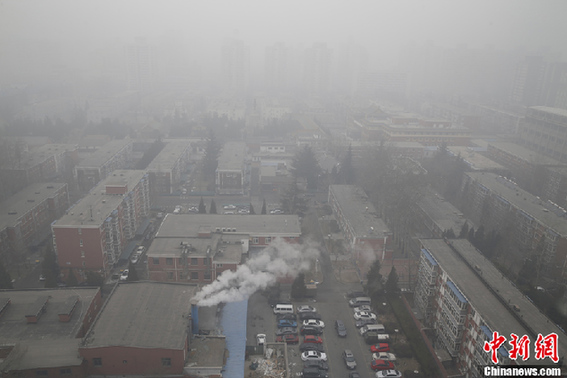Beijingers Call for Clean Air Act
Xinhua News Agency, February 26, 2013 Adjust font size:
 |
| Dense smog shrouds Beijing on Jan. 29. [Chinanews.com] |
The fourth round of heavy smog to hit Beijing in four weeks has sent more people to the hospital with respiratory illnesses and prompted calls for legislation to curb pollution.
Pan Shiyi, a celebrity real estate developer and prolific microblogger with 14 million followers, on Tuesday said he is planning to propose a Clean Air Act to the local legislature and government.
Pan, a deputy to the Beijing Municipal People's Congress, started an online poll at 9:20 AM Tuesday, the results of which will be included in his report to the lawmaking body and the municipal government, he said.
Within three hours, more than 25,000 web users, or 99 percent of total respondents, welcomed his proposal on Sina Weibo, China's Twitter.
They have good reason to stand alongside Pan.
The latest round of murky haze, described by many native Beijingers as the "worst fog ever," began to choke the Chinese capital on Monday and worsened on Tuesday, reducing visibility to under 500 meters in many parts of the city proper.
"I'm standing outside my office building but am unable to see its top," wrote one office worker who posted a picture of her office building obscured by the putrid air in downtown Beijing in Sina Weibo.
The smog has also led to a surge in respiratory illnesses, particularly among children and the elderly.
A pediatric hospital in downtown Beijing has treated a record 9,000 children this month, mostly flu, pneumonia, tracheitis, bronchitis and asthma patients.
Anxious parents and doctors almost all blame the particulate matter in the smoggy air for the respiratory infections. Though most schoolchildren are home for the winter holidays, the bad air can easily move indoors.
Ordinary medical masks fail to provide adequate protection, so some pedestrians have taken to donning gas masks and respirators.
The causes of the scary smog are rather mysterious, though experts continue to cite excessive emissions and the mountains around Beijing that trap pollution in winter, unless there is ample wind to clear it away.

